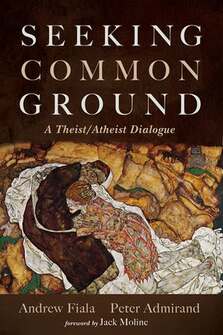
While acknowledging the change and development in the Catholic church’s attitude to interreligious dialogue and the strong bond of friendship between the Pope and Rabbi Skorka, Dr Admirand widened our understanding of dialogue to include not just believers but also those who, as atheists, do not believe in God.
Dr Admirand’s most recent book is an account of such a dialogue, his own with Dr Andrew Fiala, the Professor of Philosophy and the Director of the Ethics Centre at California State University, someone who has an interest in religion but is a declared atheist. The dialogue contained in their book Seeking Common Ground: An Atheist-Theist Dialogue is refreshing in that, like so many of these kinds of dialogues, it is not polemical with one side or the other trying to prove or disprove the existence of God. Rather it focuses on the common ground of a set of virtues which allows for an honest conversation and a common search for understanding without suspicion and resentment.
Having learned something of the faith journey of each of the writers, the rest of the chapters focus on a virtue, suggested by one of the writers and then responded to by the other. There are seven virtues in all – harmony, courage, humility, curiosity, honesty, compassion and honour. While the writers explore each virtue from their own perspective there is a learning for all of us in considering their role in interfaith relations. Some, it would seem to me, refer to the attitudes necessary for dialogue – a desire for harmony so that we are willing to set aside, at least for the time of dialogue, judgements and prejudices; a humility in listening to the truth as another sees it while recognising and acknowledging the terrible consequences of the failings of religions and ideologies; a compassion that recognises our shared humanity in its seeking for truth, even if we come up with different answers; an honour that respects and values the integrity of the other and an honesty that allows us to see how others might interpret and understand our words and actions. Recently Pope Francis, a great advocate of dialogue, found himself challenged when he suggested that the Torah does not offer fulfilment but is in fact a journey that leads to an encounter with Christ, seemingly undoing advances in Catholic – Jewish relations from the days when Christianity was thought to supersede Judaism and render it irrelevant. Now the Vatican is having to clarify that the Pope was speaking within the context of Christian scripture and stating “the abiding Christian conviction is that Jesus Christ is the new way of salvation. However, this does not mean that the Torah is diminished or no longer recognized as the ‘way of salvation for Jews.”
When such a thing happens to a Pope it is newsworthy, but such misunderstandings can happen in dialogue to all of us though if the dialogue is based on friendship, as is the case with the Pope’s relationship with the Jewish community, the upset can be talked about openly and be a moment of learning for everyone. But it is fear of such incidents that can keep some people from engaging in dialogue. Courage is then needed to break out of our sense of self-sufficiency and comfort and enter the world of another. For those of us who have done it, the journey is transformative and enriching but taking the first step can be difficult. Perhaps it is at that point that curiosity is something to be valued as a motivation for setting out on what is truly an adventure.
At our colloquium Dr Admirand highlighted curiosity as the value he hesitated over and some attending the event agreed with him. He noted that the Catholic tradition, based as it is on the certainty of Revelation, was suspicious of curiosity believing that it could undermine religious belief and, in their book, Dr Fiala states his belief that progression in science, psychology and other disciplines has done just that, especially since the Enlightenment. It certainly has taken many people beyond what Fiala calls naïve religion and that surely must be a good thing. There is of course a dangerous curiosity and today we are aware of the dangers of the internet, experimentation with drugs and other substances for example that can lead young people to play with fire – metaphorically if not literally. Pope Francis has warned against idle curiosity that is empty and superficial, but he has also said “the secret to joy: never suppress positive curiosity; get involved, because life is meant to be lived”.
Within the context of interreligious dialogue curiosity is surely a value which, if strong enough, gives us the courage to enter into the world of others and come back to our own changed and enlightened not just about the other but also about ourselves, our beliefs and the world we inhabit.



 RSS Feed
RSS Feed
